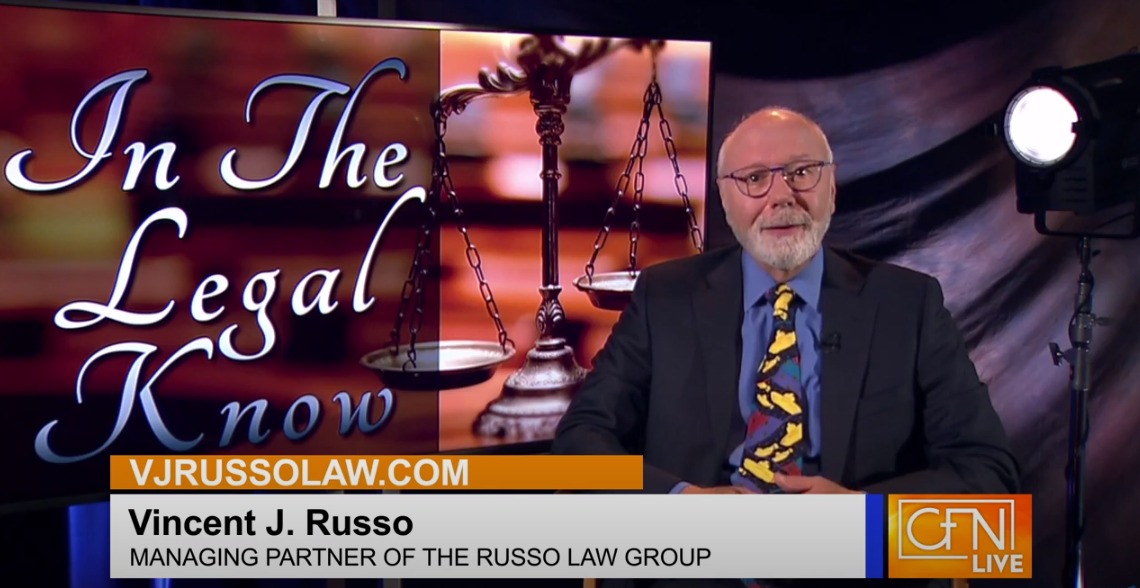This originally aired on the Catholic Faith Network’s show CFN Live: https://youtu.be/aQgwbQkJtC0 How can SSI…

Vincent Russo on CFN Live – Who are the Fiduciaries in Your Estate Plan?
Vea a Vincent J. Russo como corresponsal jurídico en el programa CFN Live de Catholic Faith Network.
Vincent appeared on CFN Live on Febrero 1st to discuss “Who are the Fiduciaries in Your Estate Plan?”
Colleen:
Vincent, often legal terminology gets in the way of people understanding their legal documents. I understand that you would like to address: Who are the Fiduciaries in one’s estate plan?
Vincent: Colleen, let’s start off with the definition of a fiduciary.
A person or an organization who has the power and obligation to act for another (often called the beneficiary) under circumstances which require total trust, good faith and honesty.
Being a fiduciary thus requires being bound both legally and ethically to act in the other’s best interests.
A fiduciary may be responsible for the general well-being of another (e.g., a child’s legal guardian), but often the task involves finances, managing the assets of another person, or a group of people, for example. Money managers, financial advisors, bankers, insurance agents, accountants, executors, board members, and corporate officers all have fiduciary responsibility.
Colleen: Vincent, can you explain the role of the fiduciary in an estate plan or in a trust and estate administration
Vincent: Let’s start with four types of Fiduciaries in one’s estate plan: Executors, Trustees, Agents and Guardians.
- Executors for beneficiaries under a Will
- Trustees for beneficiaries under a Trust
- Agent for the principal under a Durable Power of Attorney and Health Care Proxy
- Guardian for a Minor Child under a Will
Let’s start with an executor of an estate is an individual appointed to administer the last will and testament of a deceased person. The executor’s main duty is to carry out the instructions to manage the affairs and wishes of the deceased. The executor is appointed either by the testator of the will (the individual who makes the will) or by a court, in cases wherein there was no prior appointment.
Also, under a Will, one can name a legal guardian for a minor child (under age 18 in New York). This would be an individual (usually a family member) who is in charge of the person and property of the minor child.
Colleen: Vincent, many people set up trusts, can you speak to us about the role of the Trustee?
Vincent:
A trustee is a person or firm that holds and administers property or assets for the benefit of a third party.
Under a trustee/beneficiary duty, the fiduciary has legal ownership of the property or assets and holds the power necessary to handle assets held in the name of the trust.
Trustees are required to make decisions in the beneficiary’s best interests and have a fiduciary responsibility, to do so, including managing their assets and distributing them according to the Trust.
Colleen: Now, you mentioned agents – how do they come into play?
Vincent:
As part of an estate plan, we discuss with clients having Advance Directives:
A Durable Power of Attorney for financial decision-making and a Health Care Proxy for health care decisions. The agent is the person in your DPOA or HCP who is named to act on your behalf and carry out your wishes
Durable Power of attorney (POA) is a legal authorization that gives a designated person, termed the agent or attorney-in-fact, the power to act for another person, known as the principal. The agent may be given broad or limited authority to make decisions about the principal’s property, finances, investments, or medical care
Health Care Proxy is a legal document that states a person’s wishes about receiving medical care if that person is no longer able to make medical decisions because of a serious illness or injury.
In New York the Health Care Proxy Law allows you to. appoint someone you trust — for example, a family. member or close friend – to make health care decisions. for you if you lose the ability to make decisions yourself. By appointing a health care agent, you can make sure.
Colleen: how do you decide on who to select as a fiduciary
Vincent: This is a challenging question for many of my clients. Special care should be taken to determine who is designated as a fiduciary in one’s estate plan.
I would start with trust and good judgment as the two characteristic traits when deciding on who to appoint as a fiduciary.
It is also important to note that this is a very decision on the party of an individual fiduciary as well. There is Fiduciary risk: the individual who acts as a fiduciary is personally liable for his or her actions. Unethical or illegal acts or self-interest can lead to fiduciary abuse or fraud.
Clients are often inclined to choose one of their children to serve in these roles based on birth order, gender, or geographical location. These are generally not good criteria for selecting a fiduciary. Here are five things to consider when deciding who to name to fiduciary positions.
Five Tips in Selecting a Fiduciary
- Consider choosing different people to serve in the various fiduciary positions. Choosing different people to serve in these roles may be appropriate depending upon your situation.
- Consider appointing co-fiduciaries. You can appoint more than one person to serve as your attorney-in-fact, Personal Representative and Trustee. Doing so makes sense in situations where: co-fiduciaries can work well together or you have a complex situation.
- Consider the term of your Trust and the value and character of your assets when choosing a Trustee. If your Trust will continue during the lives of your children and then grandchildren, you need to consider your Trustee provisions carefully. If you name an individual Trustee, how old is that person and for how long will he or she be able to competently serve as Trustee? Who will serve when that person cannot? Will you give your children the right to appoint successor Trustees? If they fail to do so, how will your successor Trustee be appointed?
If your estate includes a business, or multiple pieces of real estate, or a very large investment portfolio, consider carefully whether any of your family members have the skills to manage those assets when you are not around to do so.
- Sometimes a professional Trustee is the best choice. If your family members do not get along, if your children are too busy to devote the time that will be needed to settle your estate, or if you do not have a family member who is well-suited to serve as your Personal Representative or Trustee, consider naming a professional Trustee. A professional fiduciary is typically a bank, trust company, lawyer, or accountant.
The is a cost to hiring a professional or corporate fiduciary which is their fee. However, if designating a professional means that your estate is settled promptly and efficiently, and that your Trust is properly administered, then the cost of a professional fiduciary is money well spent.
- If selecting a non-professional as a fiduciary, look for these traits. A fiduciary owes the highest duty of good faith and fair dealing to those he serves. When considering your family members for fiduciary positions, look for someone who has the following character traits:
- Organized
- Diplomatic
- Even tempered
- Responsible
- Financially astute
The person you choose to serve as your fiduciary can “make or break” your estate plan so choose wisely. Your estate planning attorney can help you make the best decision based on your particular family situation, assets, and distribution plan.
Si desea más información sobre estos temas y otros, puede descargar gratuitamente nuestras Guías de planificación desde el sitio web de nuestro bufete, vjrussolaw.com.
Puede encontrar a Vincent en episodios anteriores de CFN Live haciendo clic aquí.
Los temas incluyen:
- Cambios en el programa de atención domiciliaria de Medicaid del Estado de Nueva York
- Conceptos básicos de planificación patrimonial - Parte 1: ¿Por qué necesito un plan de sucesión?
- Conceptos básicos de planificación patrimonial - Parte 2: ¿Qué incluye un plan patrimonial?
- Conceptos básicos de planificación patrimonial - Parte 3: ¿Cuándo y por qué debo actualizar mi plan patrimonial?
- Planificación patrimonial para niños con necesidades especiales - Parte 1: ¿Cómo cuido y protejo a mi hijo?
- Planificación patrimonial para niños con necesidades especiales - Parte 2: ¿Qué prestaciones públicas existen?
- Planificación patrimonial para niños con necesidades especiales - Parte 3: ¿Qué medidas debo tomar para mi hijo adulto con necesidades especiales?
- Planificación de la asistencia a largo plazo - Parte 1: "¿Cómo pago la asistencia a largo plazo?"
- Planificación de la asistencia a largo plazo Parte 2: "¿Cómo puede ayudarme la asistencia domiciliaria de Medicaid?"
- Planificación de la asistencia a largo plazo - Parte 3: "Cómo cumplir los requisitos para Medicaid"
- ¿Qué es un poder notarial?
- Actualizaciones jurídicas importantes
Esperamos que sintonice CFN Live. Es un programa dinámico con noticias de actualidad y colaboradores fascinantes que tienen historias inspiradoras que contar. El nuevo programa CFN Live se emite de lunes a viernes. a las 9 de la mañana y a las 7 de la tarde. Podrá ver el programa en cualquier momento, según le convenga, en el canal de YouTube de CFN.
a las 9 de la mañana y a las 7 de la tarde. Podrá ver el programa en cualquier momento, según le convenga, en el canal de YouTube de CFN.
Puede obtener más información sobre la Red de Fe Católica y CFN Live visitando https://www.catholicfaithnetwork.org/cfn-live.
 Socio Director de Russo Law Group, Vincent J. Russoes uno de los principales colaboradores del nuevo programa CFN Live de Catholic Faith Network. Vincent es el corresponsal jurídico del programa. En su segmento, titulado "In the Legal Know", Vincent le mantendrá al tanto de las últimas novedades legales, incluyendo la ley de ancianos, necesidades especiales y planificación patrimonial - todo para ayudarle a tomar decisiones de planificación informadas para protegerse a sí mismo, a sus seres queridos y a sus activos.
Socio Director de Russo Law Group, Vincent J. Russoes uno de los principales colaboradores del nuevo programa CFN Live de Catholic Faith Network. Vincent es el corresponsal jurídico del programa. En su segmento, titulado "In the Legal Know", Vincent le mantendrá al tanto de las últimas novedades legales, incluyendo la ley de ancianos, necesidades especiales y planificación patrimonial - todo para ayudarle a tomar decisiones de planificación informadas para protegerse a sí mismo, a sus seres queridos y a sus activos.



Esta entrada tiene 0 comentarios